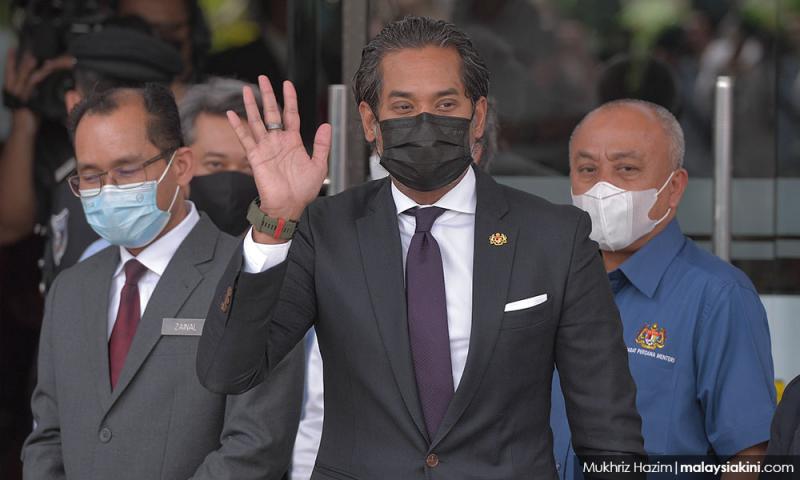MP SPEAKS | Khairy must reset healthcare system, Covid-19 strategy
MP SPEAKS | First and foremost, I would like to congratulate Khairy Jamaluddin on his recent appointment as the 23rd health minister of Malaysia. His appointment comes at a pivotal time, especially to bring fresh perspective in leading our Malaysian National Health Agenda (ANMS) in the midst of a pandemic.
I had hoped initially that the health minister would be appointed as a senior minister to acknowledge the importance of the role during this pandemic as well as spark a paradigm shift to make sure health is included in all policies of the government moving forward.
Even so, I hope his appointment will be a catalyst for a “reset” in the country’s approach towards Covid-19 and bring us out of this pandemic, especially since the virus is still ripping through the country with growing numbers of Covid-19 infections and deaths in our country totalling 1,662,913 cases and 15,550 deaths as of August 27, 2021.
With the same determination and focus he and his team has brought to the Covid-19 vaccination effort, we hope to see him and his ministry get down to work and address some of complex and multifaceted issues in the current Malaysian healthcare system whether on a short or long-term basis.
I would like to bring up a few which I believe are crucial to set the tone and build the foundation for sustainable reform and renewal in the healthcare system in Malaysia.
(1) A new approach towards Covid-19 that is evidence-based, including a focus on the fundamentals of infectious disease control guided by the ground realities, lived experiences, and the expertise of all Malaysians.
This includes a significant investment to strengthen the public health capacity to implement the Find-Test-Trace-Isolate-Support (FTTIS) strategy alongside vaccination, and not at the expense of one another.
This is in line with the WHO regional director Dr Takeshi Kasai’s statement that vaccines alone will not put an end to the Covid-19 epidemic in Malaysia, and that the country should also implement effective intervention measures to control the outbreak.
This includes coming up with a comprehensive National Testing Plan to address the high positivity rate for the past months. The test positivity rate has exceeded 10 percent for 38 consecutive days, indicating widespread under-testing and that the actual number of Covid-19 cases is likely significantly higher than the reported figures.
In order to prepare the nation to live with endemic Covid-19, strategic risk communication must be ramped up to explain the transition to endemic disease so that the public will be educated and prepared for the new normal.
The National Covid-19 Immunisation Plan (NIP) must also be moved back to the helm of the Health Ministry for better implementation and streamlining of bureaucracy.
He must also quickly announce a comprehensive plan for adolescent immunisation, especially in view of schools reopening and loosening of restrictions.
(2) A holistic plan to expand the public health service capacity while efficiently integrating private players into the pandemic response to deal with the current and future load arising from Covid-19, its potential variants, and future infectious diseases.
This includes ramping up healthcare infrastructure, especially in rural areas and addressing long-term manpower issues. This includes many longstanding issues such as the plight of contract doctors and also the chronic neglect of the health system and infrastructure, especially in East Malaysia.
(3) Better integration of science and technology into health, including proper and transparent use of data in Covid-19 detection systems for pandemic control.
On top of better transparency and better open-sourcing for Covid-19 data via GitHub, it is also important to improve the effectiveness of detection systems such as the current HIDE system.
There must be better integration of artificial intelligence (AI) into health itself, including to improve public health measures such as contact tracing and surveillance.
(4) An immediate review and plans to address the possible worsening prognosis and increase in mortality due to neglect of non-Covid-19 cases during this public health emergency.
An enhanced and stronger focus on the National Strategic Plan for Non-Communicable Disease (NCDs) in Malaysia to address this health “time-bomb” among our population
(5) To set the foundation for long-term reforms including the formation of a “Health Reform Commission” to draft out mid- to long-term reforms to “re-think” and reform our healthcare system.
The commission can be a vehicle to frame a reformation in essential areas of healthcare including the financing system, manpower resources, healthcare infrastructure, data collection and analysis in healthcare, and many others.
One of the first roles this committee can play is a comprehensive review of our country’s Covid-19 approach to learn from mistakes and repeat best practices to prepare our country to prevent and manage future pandemics.
With these initial five fundamentals, I do hope the minister and his team will be able to set forth a solid foundation for a better health system for our country. All these can be achieved through better and open engagements with all stakeholders including experts from the private sector, academia, NGOs and even the opposition.
While it is important for us to find ways to reset the economy as soon as possible, there is no better way to reset it than to build strong and comprehensive public health measures to control Covid-19.
So, I hope this appointment will spark a fundamental reset to our approach towards Covid-19 and also needed long-term reforms to our healthcare system for the good of the people.
DR KELVIN YII is Bandar Kuching MP and chairperson of the Parliamentary Select Committee on Health, Science and Innovation.
The views expressed here are those of the author/contributor and do not necessarily represent the views of Malaysiakini.
RM12.50 / month
- Unlimited access to award-winning journalism
- Comment and share your opinions on all our articles
- Gift interesting stories to your friends
- Tax deductable
